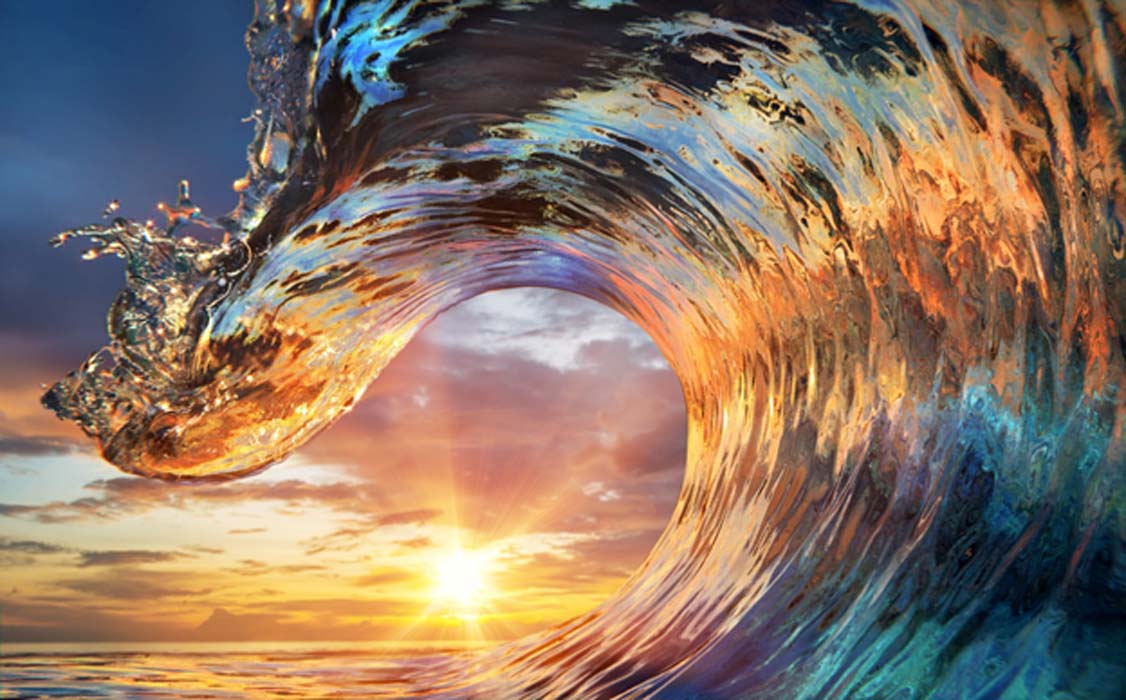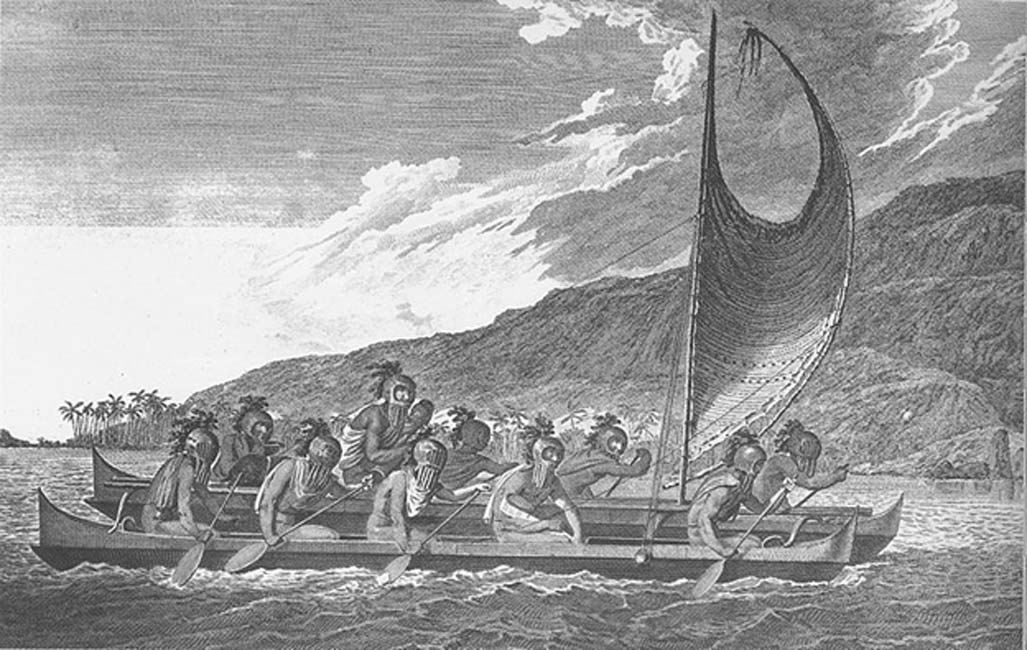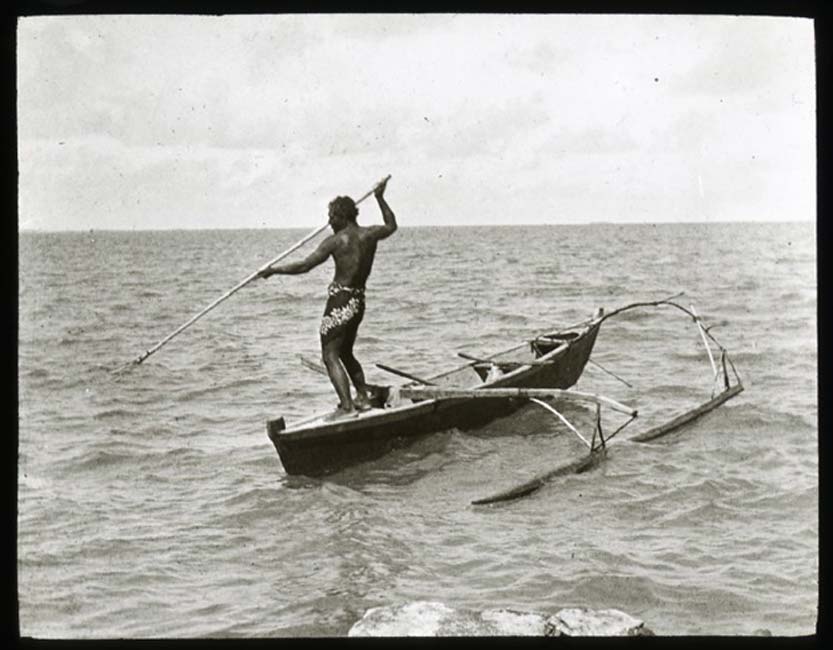
Hawaiian Ancient Surfing, the Sport of Gods and Royalty
Water created worlds, bore deities, eliminated pain and purified souls. The sea in particular is an untamable, dangerous, often violent place and considered in many cultures as representing the mysteries of the underworld. As such great power naturally attracts attempts to conquer it, surfing and the riding of waves have existed since humans began swimming in the ocean.

Priests traveling across Kealakekua bay in the book Hawai`i Looking Back: An illustrated History of the Islands. Artist John Webber aboard Cook’s ship (Pubic Domain)
Evidence of the practice of various forms of ancient surfing sports among the islands within the Polynesian Triangle defined by Hawaii, New Zealand, and Easter Island ranges from children’s games to catching waves with any piece of wood or brush. Surfing is ingrained into the very fabric of Hawaiian religion and culture. It was used as part of warriors’ training in Tahiti and Samoa where warriors often spent hours paddling head on into large surf before riding the waves. Surfing was also practiced in the Polynesian kingdom of Tonga, popularized by the late king Taufa’ahau Tupou IV (1918 – 2006) who was himself a keen sportsman.
Ancient Gods of Water
The significance of the life-giving role of water is evident by its central role in creation myths. In Assyro-Babylonian mythology, the gods and all of nature’s creations derived from the mixing of the fresh waters (Abzu) with those of the seas (Tiamat), while the abyss was considered a symbol of wisdom. For the ancient Egyptians, the world rose out of the lifeless waters of chaos called Nu. A mound emerged from its waters, giving life to the first habitant, Atum. All living creatures were born from Atum’s tears. In Ancient Greece, philosopher Heraclitus (circa 535 – 475 BC) considered water to be: “first beginning, the creator of all”. For the ancient Chinese, the waters from the Pon Lai spring gave a thousand lives to those who drink it.

Polynesian outrigger canoe at sea (Public Domain)
In Ancient Egypt, the river was the passage between life and death as the souls of the dead were transferred with a boat on the Nile to the kingdom of the dead. The river also transferred the dead to the underworld in Ancient Greece through the river Styx. Before they could be reborn, the dead had had to drink water from the river Lethe (oblivion) to erase every memory from their previous life, which was described by Plato as: “...the river of unmindfulness, whose water no vessel can hold; of this they were all obliged to drink a certain quantity, and those who were not saved by wisdom drank more than was necessary; and each one as he drank forgot all things.”
- The Mythological Pantheon of Ancient Islands: Cosmic Sharks and Whale Riders
- The Mysterious Holes of Peru: A Pre-Columbian Domestic Water Source for Trans-Oceanic Travelers?
- Secret and Safe: Hawaiian Royal Burials and the Missing Bones of Kamehameha the Great
Ocean deities are frequently shown to ride their chariots on violent waves to depict their power over their domains. In Greek mythology, Poseidon was known for driving his chariot through the giant swells, soothing the sea and creating islands out of nothing. His daughter Benthesikyme, the ‘lady of the deep swells’, was the goddess of the waves. Another one of his daughters, Cymopoleia, is the goddess of the violent sea storms and earthquakes. In Javanese mythology, the Queen of the South Seas, Nyai Roro Kidul emerged from her domain under the sea riding a Naga carriage. In Mesopotamia, the deity more closely related to man was Enki, the god of springs and rivers, who was the one who reassured the affluence of rivers. He is depicted on seals with the rivers Tigris and Euphrates, where there are fish swimming.
Ancient Hawaiian Holy Surfing
Of the ancient Hawaiians, anthropologist Kenneth P. Emory (1897 - 1992) writes that: “no important contest was engaged in without approaching the gods with prayers and offerings to win their favor. Over every sport some god presided." Therefore, the art of surfing commenced before entering the ocean itself as they prayed to the gods for protection and strength to ride on it. When the waves were still, the people would attempt to invoke the rising of the surf, commonly by taking the strands of the pohuehue (morning glory) and lash the surface of the water in unison as they chanted. If the ocean was still tamed, frustrated surfers would call a priest who would aid them in a prayer asking the gods to deliver a good surf for them.




